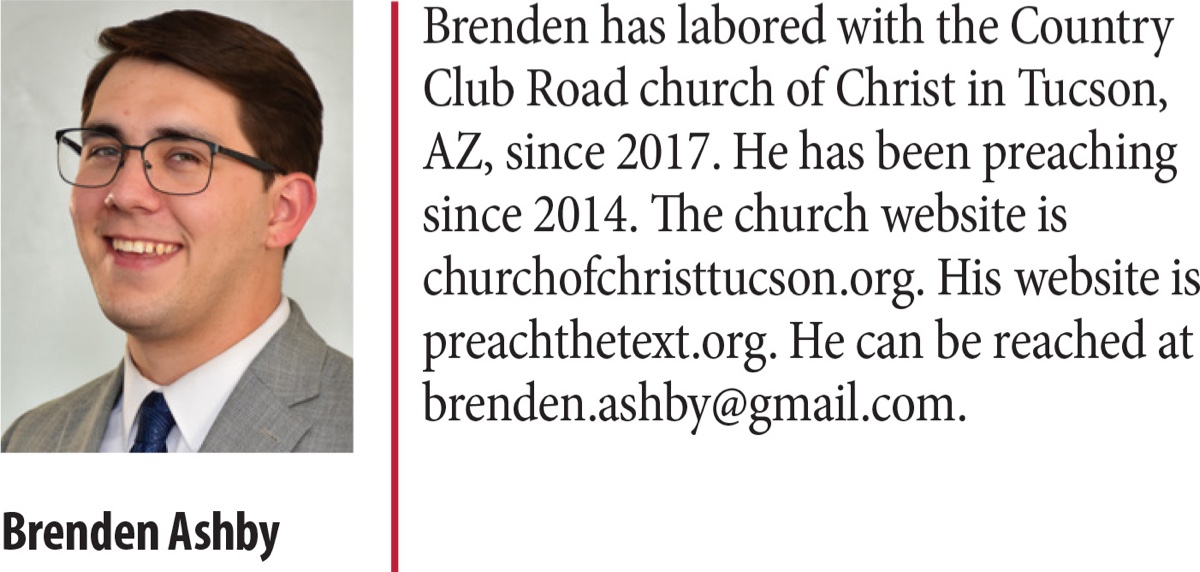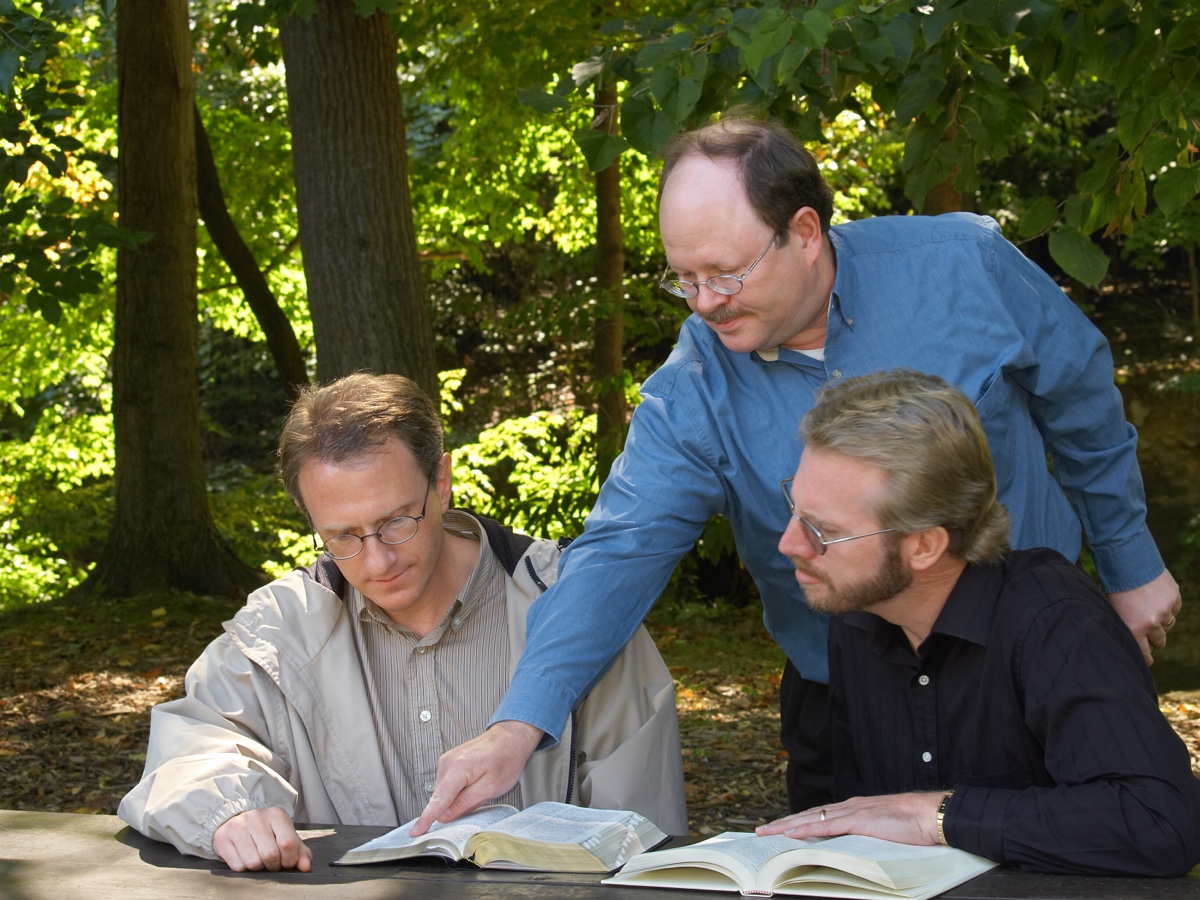By Brenden D. Ashby
Synopsis: As God gave husbands/fathers the role of leading the family, He gave elders responsibility for overseeing the local church. In like manner, children have a duty to their fathers, and congregations bear certain responsibilities toward their elders.
Near the end of the book of Hebrews, the author admonishes his readers to “Obey your leaders and submit to them, for they keep watch over your souls as those who will give an account. Let them do this with joy and not with grief, for this would be unprofitable for you” (Heb. 13:17, NASB). It is a great blessing to be in a congregation that has elders—especially ones that labor diligently in teaching and preaching (1 Tim. 5:17).
When we study elders, we often spend a lot of time on the qualifications, and the work which they must perform (1 Tim. 3:1-7; Titus 1:5-9). However, seldom do we think that the congregation owes something to the eldership! Brother H.E. Phillips stated this point well: “The very fact that God has placed certain responsibilities upon the elders toward the church implies certain obligations of the church toward the elders” (Phillips, 213). Therefore, let us consider eight things that a congregation owes its elders.
Elders are to “shepherd the flock of God among you” (1 Pet. 5:2). Shepherding involves knowing and being known to the flock. Jesus, the master Shepherd, said, “I am the good shepherd, and I know My own and My own know Me” (John 10:14). There should be familiarity between the sheep and their shepherds. Yet, this is a two-way street. Like in any relationship, it involves “give and take.” Shepherds cannot know their sheep if the sheep keep running away from their shepherds and make no efforts to know them.
In 1 Thessalonians 5:12, Paul instructs us to “appreciate those who diligently labor among you, and have charge over you in the Lord and give you instruction.” The ASV renders this verse as “to know them that labor among you.” To appreciate is to know the full worth of something or someone. For us to come to see the value of our elders, we have to know them. To know our elders means we need to invest the time to build our relationships with them. A simple way to start would be to talk with a different elder each Lord’s day.
Staying in 1 Thessalonians 5 and looking at verse thirteen, we are instructed to “esteem them very highly in love because of their work.” To esteem someone is to respect them. However, our duty goes further than just respect. We are to esteem our elders “very highly in love”—the same love that is due to every fellow believer (1 Cor. 13). We are to do so because of their work. It is a work that very few men are qualified to do, and that very few will have the privilege of doing.
At the end of 1 Thessalonians 5:13, Paul says, “Live in peace with one another.” Not only are our elders worthy of respect, but we, as the flock allotted to their charge, owe them as much as it depends on us, to be a peace with one another (Rom. 12:18).
We need to strive to be a flock that is a joy and not a burden to oversee (Heb. 13:17). Let us strive to be a harmonious flock. Let us strive to be submissive sheep that when we come to the elders, it is because we need the comfort and guidance of their shepherding, not because of petty disputes.
We read in Hebrews 13:17, “Obey your leaders and submit to them, for they keep watch over your souls as those who will give an account. Let them do this with joy and not with grief, for this would be unprofitable you.” Submission and obedience here described is not a one-way street. There is a cooperation between the elders and the saints in a congregation. Elders diligently labor in the work God has given them. Because they do so, we, as the flock, are to submit and obey their rule. Our submission and obedience are for our soul’s benefit, the Hebrew writer states. It is for our benefit because the elders then can focus solely on the task of shepherding.
In 1 Timothy 5:1, we are instructed, “Do not sharply rebuke an older man, but rather appeal to him as a father.” In verse 19, Paul exhorted Timothy, “Do not receive an accusation against an elder except on the basis of two or three witnesses.” The Scripture is clear: because these are older men, and because of the respect we are to have for the men serving as elders, we should be very careful in bringing accusations against the elders. If such words are spoken in our presence, we should not join in, but put a stop to them.
If I have an issue with an elder or the eldership, I need to show the respect that is due to them by going to them privately to express my concern—privately, because of my concern and care for the unity of a local body. To rebuke an elder publicly, or for that matter, another Christian, is reserved for when I have done all I can to turn a brother from his sin (Matt. 18:15-18). If error has been taught publicly, of course, it needs to be addressed immediately. (Paul rebuking Peter in Galatians 2:11-14 would be one example.)
Looking at Hebrews 13:7, the author encouraged his readers to remember their previous leaders (i.e., elders) and how they labored among them: “Remember those who led you, who spoke the word of God to you; and considering the result of their conduct, imitate their faith.” Good flesh and blood examples of the Christian life are worthy of being imitated (1 Cor. 11:1), no less so for elders.
One thing that Christians owe their elders is something we rarely think about—financial support. The apostle Paul, in 1 Timothy 5:17-18, stated that the elders who “work hard at preaching and teaching” are worthy of “double honor.” This can mean financial support, and in context, I believe that is what the apostle is teaching. However, there is a broader principle here. Namely, those elders who are laboring diligently are worthy of our ample support in whatever way we can give it. A simple and impactful way to show our elders this support is to thank them for their work. A word of encouragement can go a very long way.
Perhaps one of the most important duties that we, as members of the flock, owe to our elders is to come to them when we are in need. The disciple James wrote, “Is anyone among you sick? Then he must call for the elders of the church, and they are to pray over him, anointing him with oil in the name of the Lord” (Jas. 5:14).
These men have voluntarily accepted the work of shepherding. They do so because, at an elder’s core is the desire to help their brethren. There is a care and concern for their brothers and sisters in Christ. One way we show our support for them is to call on them. Do so when Satan is attacking us, when the world seems to creep in, and when we need strength to take the next step on the path of discipleship. The shepherd’s crook should be a symbol of comfort, and his rod is a symbol of fear to those who would harm the flock.
It is an immense blessing to be in a congregation with elders. I have been blessed to have spent most of my life as a Christian under the care and direction of elders. For those of us who benefit from this blessing, let us remember, we owe them our love and support. Let us also remember our brethren without shepherds and offer a prayer that godly men would be raised up to shepherd the flock of God.
New American Standard Bible: 1995 Update. La Habra, CA: The Lockman Foundation, 1995.
Phillips, H.E. Scriptural Elders and Deacons. Bowling Green: Guardian of Truth Foundation Publications, 1959.



